Unit 8 I’ll help to clean up the city parks 单元复习课件(共33张PPT)
文档属性
| 名称 | Unit 8 I’ll help to clean up the city parks 单元复习课件(共33张PPT) |
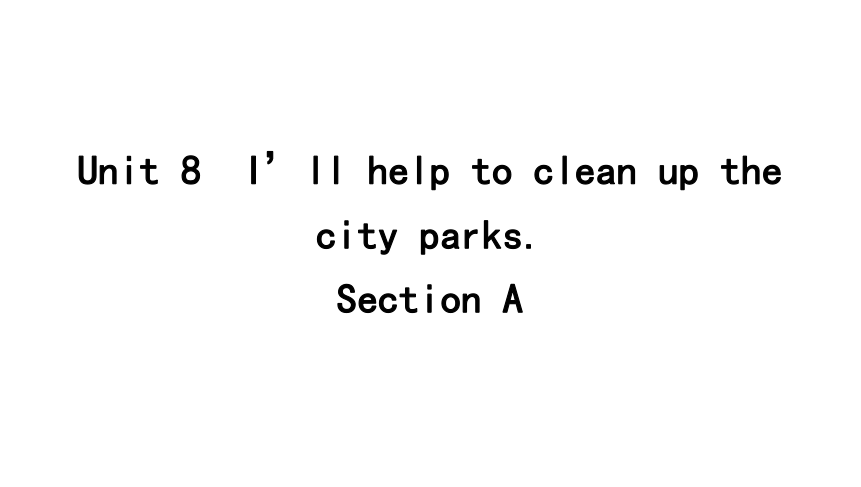
|
|
| 格式 | pptx | ||
| 文件大小 | 198.0KB | ||
| 资源类型 | 教案 | ||
| 版本资源 | 鲁教版 | ||
| 科目 | 英语 | ||
| 更新时间 | 2024-07-06 08:29:22 | ||
图片预览

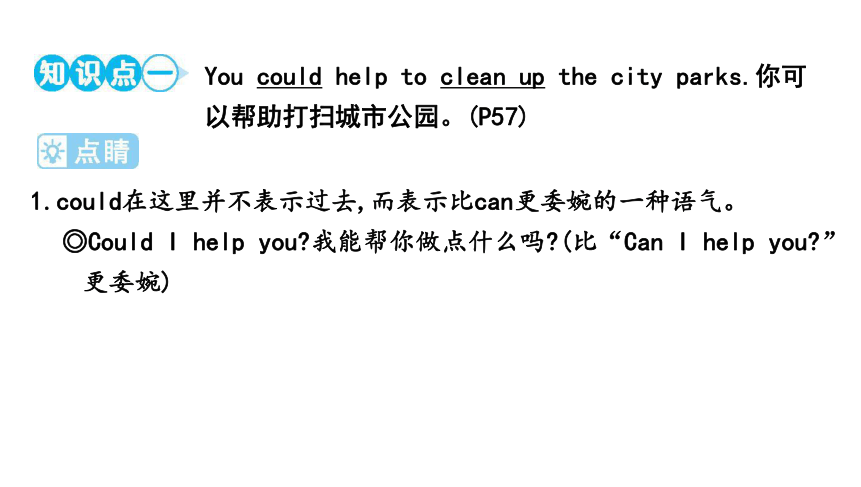
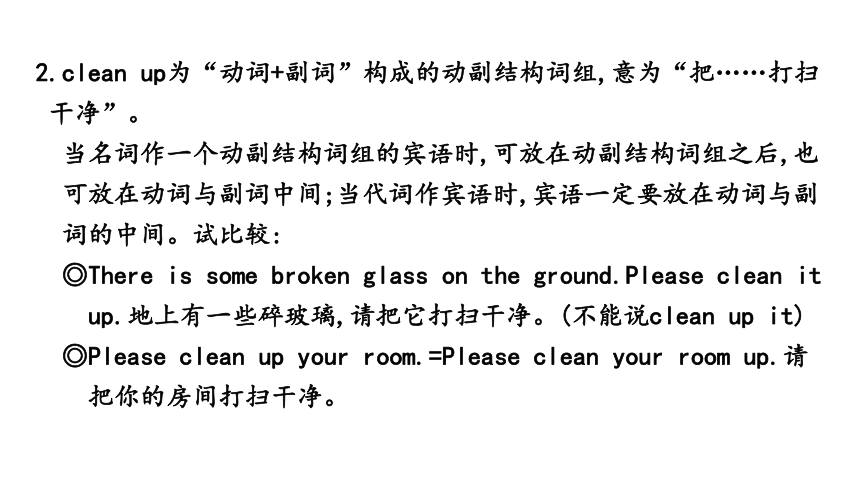
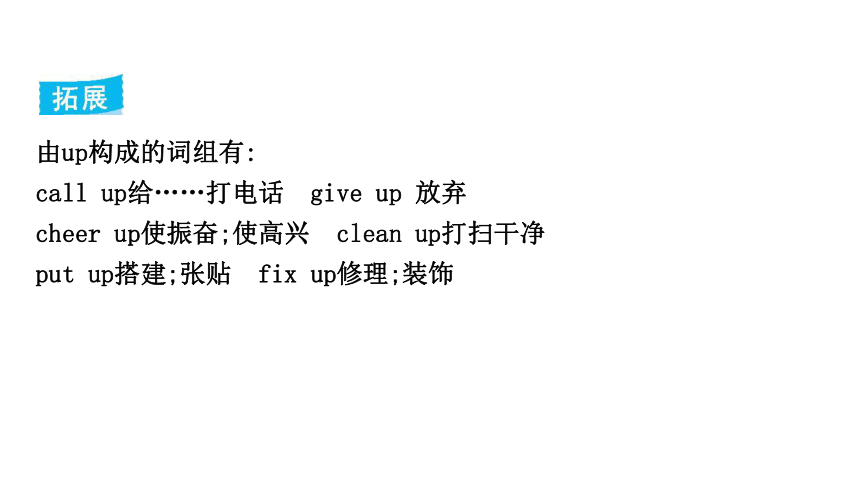
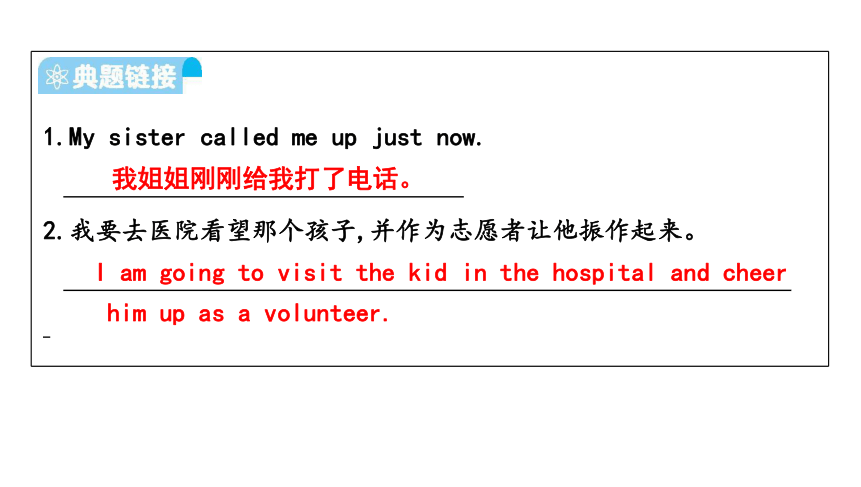
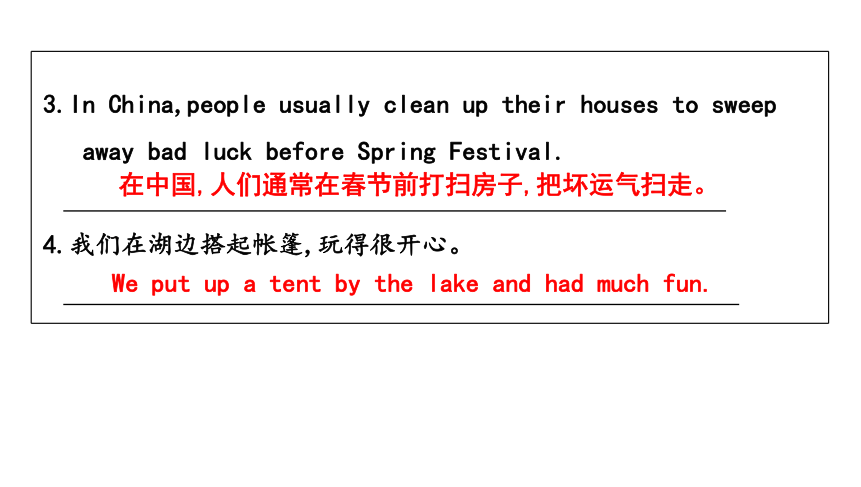
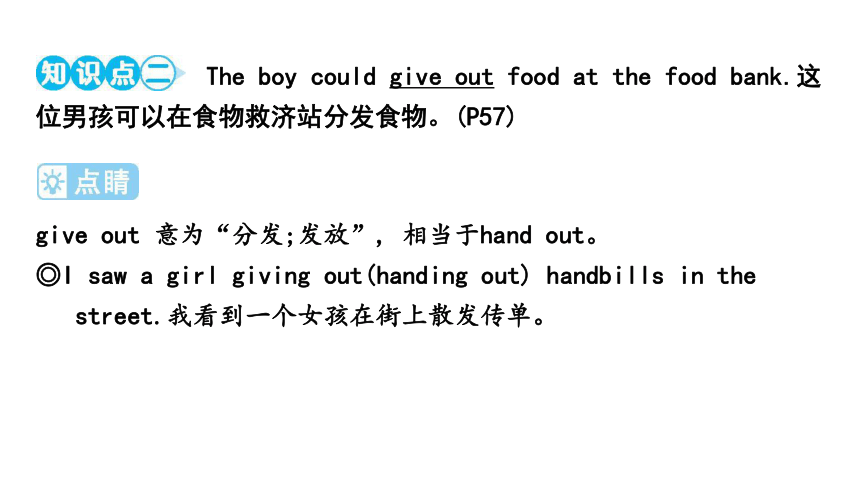
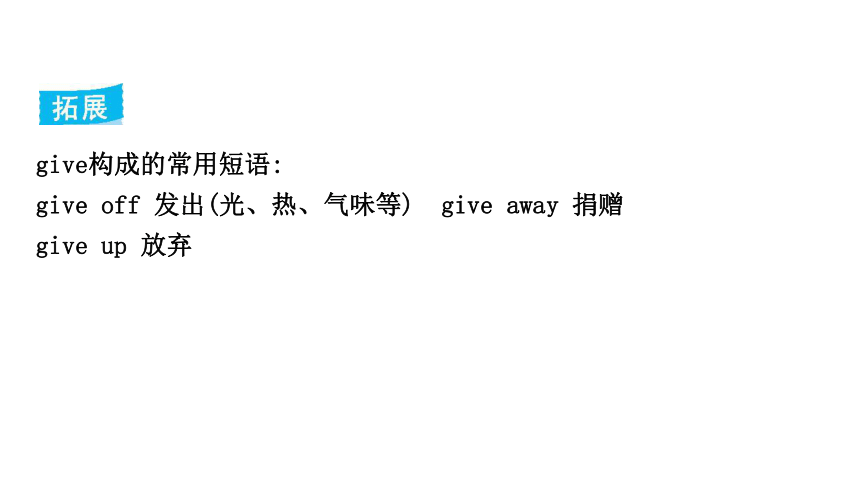
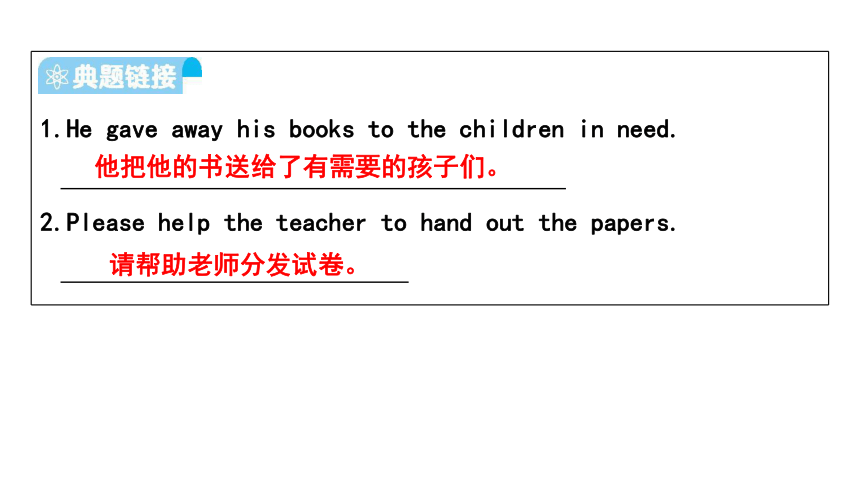
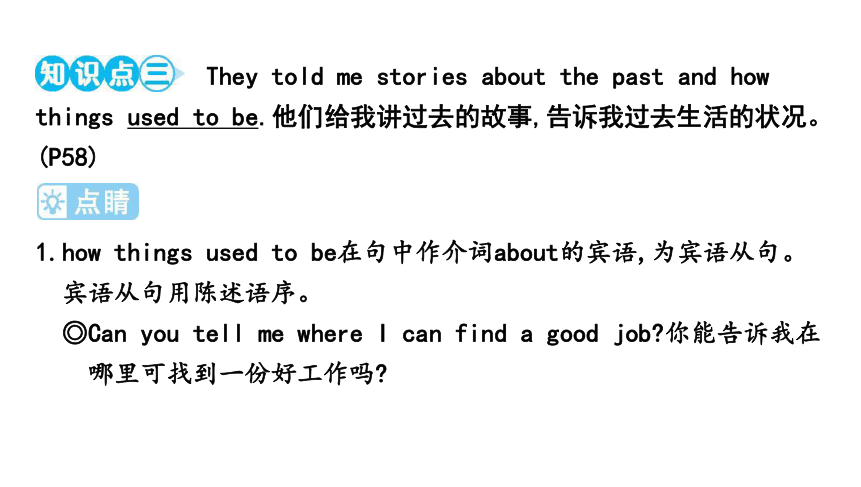
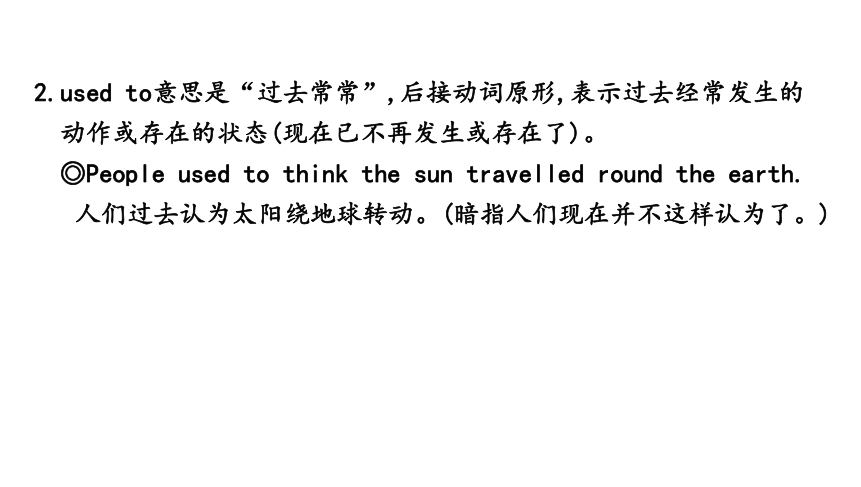
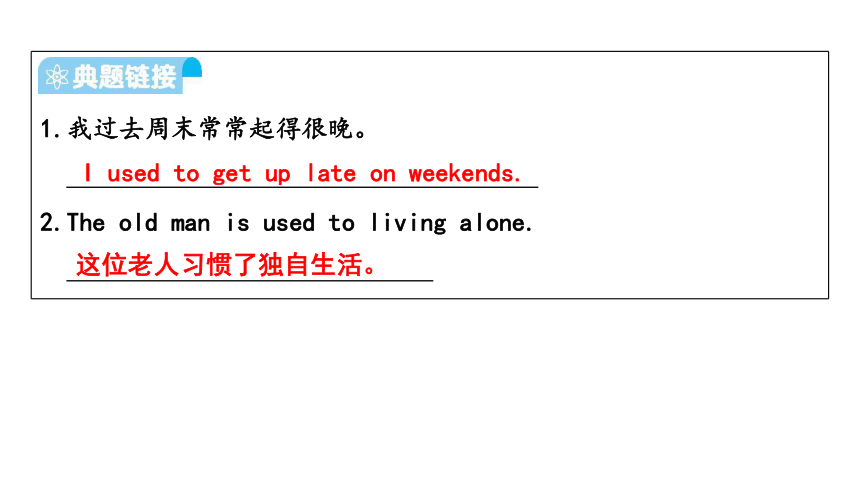
文档简介
(共33张PPT)
Unit 8 I’ll help to clean up the
city parks.
Section A
You could help to clean up the city parks.你可以帮助打扫城市公园。(P57)
1.could在这里并不表示过去,而表示比can更委婉的一种语气。
◎Could I help you 我能帮你做点什么吗 (比“Can I help you ”
更委婉)
2.clean up为“动词+副词”构成的动副结构词组,意为“把……打扫
干净”。
当名词作一个动副结构词组的宾语时,可放在动副结构词组之后,也
可放在动词与副词中间;当代词作宾语时,宾语一定要放在动词与副
词的中间。试比较:
◎There is some broken glass on the ground.Please clean it
up.地上有一些碎玻璃,请把它打扫干净。(不能说clean up it)
◎Please clean up your room.=Please clean your room up.请
把你的房间打扫干净。
由up构成的词组有:
call up给……打电话 give up 放弃
cheer up使振奋;使高兴 clean up打扫干净
put up搭建;张贴 fix up修理;装饰
1.My sister called me up just now.
2.我要去医院看望那个孩子,并作为志愿者让他振作起来。
我姐姐刚刚给我打了电话。
I am going to visit the kid in the hospital and cheer
him up as a volunteer.
3.In China,people usually clean up their houses to sweep
away bad luck before Spring Festival.
4.我们在湖边搭起帐篷,玩得很开心。
在中国,人们通常在春节前打扫房子,把坏运气扫走。
We put up a tent by the lake and had much fun.
The boy could give out food at the food bank.这位男孩可以在食物救济站分发食物。(P57)
give out 意为“分发;发放”, 相当于hand out。
◎I saw a girl giving out(handing out) handbills in the
street.我看到一个女孩在街上散发传单。
give构成的常用短语:
give off 发出(光、热、气味等) give away 捐赠
give up 放弃
1.He gave away his books to the children in need.
2.Please help the teacher to hand out the papers.
他把他的书送给了有需要的孩子们。
请帮助老师分发试卷。
They told me stories about the past and how things used to be.他们给我讲过去的故事,告诉我过去生活的状况。(P58)
1.how things used to be在句中作介词about的宾语,为宾语从句。
宾语从句用陈述语序。
◎Can you tell me where I can find a good job 你能告诉我在
哪里可找到一份好工作吗
2.used to意思是“过去常常”,后接动词原形,表示过去经常发生的
动作或存在的状态(现在已不再发生或存在了)。
◎People used to think the sun travelled round the earth.
人们过去认为太阳绕地球转动。(暗指人们现在并不这样认为了。)
1.我过去周末常常起得很晚。
.
2.The old man is used to living alone.
. .
I used to get up late on weekends.
这位老人习惯了独自生活。
Yeah,a lot of old people are lonely.是的,很多老人很孤独。(P58)
lonely为形容词,意为“孤独的,寂寞的;偏僻的”。
◎They live a lonely life in a lonely house in the hills.
他们在山中一栋偏僻的房子里过着寂寞的生活。
辨析:lonely与alone
词语 用法
lonely 只用作形容词,它在句中既可作定语,也可作表语,表示“孤独的,寂寞的”,该词带有浓厚的感彩;另外,该词还可意为“偏僻的;人迹罕至的”
alone 用作形容词时只作表语和后置定语,意为“独自的”;用作副词,表示“独自地;单独地”
【一言辨异】 The old man lived in a lonely village,and he lived a hard life alone.这位老人居住在一个偏僻的村子里,独自过着艰难的生活。
1.他不感到孤独。
2.He lived a lonely life all his life.
3.He finished the work alone.
He doesn’t feel lonely.
他一生都过着孤独的生活。
他独自完成了这项工作。
Section B
I take after my mother.我长得像我妈妈。(P60)
辨析:take after与look like
短语 意思及用法 例句
take after 意为“长得像,行为、性格像”,尤其是像自己的长辈,可解释为be similar to He might be the only one to take after his grandpa.
他可能是唯一一个像他爷爷的人。
短语 意思及用法 例句
look like 可以用于各种场合,既可指人也可指物,只指外表看上去像 The photo doesn’t look like her at all.
那张照片看上去一点也不像她。
( )1.It is easy to find my mother in the family photo
because I her a lot.
A.look after B.look up
C.take after D.take up
2.贝蒂在很多方面像她妈妈。
Betty her mother in many ways.
3.据说家庭成员彼此长得像。
It is said that family members each other.
takes after
takes after
Jimmy fixes up broken bicycle parts,like wheels.吉米修理破自行车零件,如车轮。(P60)
1.fix up意为“修理;装饰”。
◎Can you fix up the radio = Can you repair the radio 你能
修理这台收音机吗
2.like在这里为介词,表示举例,意为“像,如”,后可接名词、动名词。
◎She looks best in bright colors,like red and pink.她穿鲜
亮颜色的衣服最漂亮,如红色和粉色。
( )1.My bike is broken.Could you help me to A.fix it up B.set it up
C.make it up D.put it up
( )2.Jim is good at many sports, running and
swimming.
A.like B.for
C.with D.as
You helped to make it possible for me to have Lucky.你的帮助使我有可能拥有了Lucky。(P61)
句子结构分析:“make+it+形容词+(for sb.)+不定式短语”是一固定句型,不定式短语在句中作宾语。为了保持句子平衡,把宾语放在宾语补足语后面,而用it作形式宾语。
◎In order to make it easier for people to use computers,
languages for writing programs have been devised.为了人
们使用计算机更容易,便设计出了编写程序的语言。
有此用法的动词还有feel,find,consider,think等。
◎I think it important to learn English well.我认为学好英语
很重要。
( )1.At times,parents find it difficult with
their teenage children.
A.talk B.talked
C.talking D.to talk
2.我认为用这个单词造句很简单。
I think make up a sentence with
the word.
3.我感觉八点前到那里是有可能的。
I to get there before eight.
it easy to
feel it possible
...but many people have these difficulties.但很多人有这样的困难。(P61)
difficulty意为“困难,艰难;难事”,其形容词形式为difficult,有可数名词和不可数名词两种用法:
◎—Do you have any difficulty with your English 你学英语有困
难吗
—No.I had no difficulty in learning English.没有。我学英语
没有困难。
◎This book is full of difficulties.这本书中满是难点。
◎In the face of so many difficulties,we never appeared to be
afraid.面对这么多困难,我们从来不显得害怕。
1.It’s really (difficulty) for me to learn
English well.
2.I don’t have (difficult) in doing it.
difficult
difficulty
I was excited about the idea of having a dog.拥有一只狗的主意让我感到很激动。(P61)
be excited about...意为“对……感到激动/兴奋”。excited为动词excite的形容词形式,意为“对……感到兴奋的/激动的”。
◎The children were excited about opening their presents.孩子
们对打开礼物感到兴奋不已。
辨析:excited与exciting
词语 用法
excited 通常修饰人,强调感受,在句中可作表语、定语
exciting 通常修饰物,在句中既可以作表语,也可以作定语
◎He was so excited that tears started to well up in his eyes.
他激动得热泪盈眶。(主语为人)
◎Skiing is more exciting than skating.滑雪比滑冰更激动人心。
(主语为物)
1.在那时那个消息使每个人感到激动。
The news everybody then.
2.消息传来,我们大家都感到兴奋。
As the news came to our ears,we all .
3.这部影片充满了令人激动的故事。
The film is full of .
excited
felt excited
exciting stories
Unit 8 I’ll help to clean up the
city parks.
Section A
You could help to clean up the city parks.你可以帮助打扫城市公园。(P57)
1.could在这里并不表示过去,而表示比can更委婉的一种语气。
◎Could I help you 我能帮你做点什么吗 (比“Can I help you ”
更委婉)
2.clean up为“动词+副词”构成的动副结构词组,意为“把……打扫
干净”。
当名词作一个动副结构词组的宾语时,可放在动副结构词组之后,也
可放在动词与副词中间;当代词作宾语时,宾语一定要放在动词与副
词的中间。试比较:
◎There is some broken glass on the ground.Please clean it
up.地上有一些碎玻璃,请把它打扫干净。(不能说clean up it)
◎Please clean up your room.=Please clean your room up.请
把你的房间打扫干净。
由up构成的词组有:
call up给……打电话 give up 放弃
cheer up使振奋;使高兴 clean up打扫干净
put up搭建;张贴 fix up修理;装饰
1.My sister called me up just now.
2.我要去医院看望那个孩子,并作为志愿者让他振作起来。
我姐姐刚刚给我打了电话。
I am going to visit the kid in the hospital and cheer
him up as a volunteer.
3.In China,people usually clean up their houses to sweep
away bad luck before Spring Festival.
4.我们在湖边搭起帐篷,玩得很开心。
在中国,人们通常在春节前打扫房子,把坏运气扫走。
We put up a tent by the lake and had much fun.
The boy could give out food at the food bank.这位男孩可以在食物救济站分发食物。(P57)
give out 意为“分发;发放”, 相当于hand out。
◎I saw a girl giving out(handing out) handbills in the
street.我看到一个女孩在街上散发传单。
give构成的常用短语:
give off 发出(光、热、气味等) give away 捐赠
give up 放弃
1.He gave away his books to the children in need.
2.Please help the teacher to hand out the papers.
他把他的书送给了有需要的孩子们。
请帮助老师分发试卷。
They told me stories about the past and how things used to be.他们给我讲过去的故事,告诉我过去生活的状况。(P58)
1.how things used to be在句中作介词about的宾语,为宾语从句。
宾语从句用陈述语序。
◎Can you tell me where I can find a good job 你能告诉我在
哪里可找到一份好工作吗
2.used to意思是“过去常常”,后接动词原形,表示过去经常发生的
动作或存在的状态(现在已不再发生或存在了)。
◎People used to think the sun travelled round the earth.
人们过去认为太阳绕地球转动。(暗指人们现在并不这样认为了。)
1.我过去周末常常起得很晚。
.
2.The old man is used to living alone.
. .
I used to get up late on weekends.
这位老人习惯了独自生活。
Yeah,a lot of old people are lonely.是的,很多老人很孤独。(P58)
lonely为形容词,意为“孤独的,寂寞的;偏僻的”。
◎They live a lonely life in a lonely house in the hills.
他们在山中一栋偏僻的房子里过着寂寞的生活。
辨析:lonely与alone
词语 用法
lonely 只用作形容词,它在句中既可作定语,也可作表语,表示“孤独的,寂寞的”,该词带有浓厚的感彩;另外,该词还可意为“偏僻的;人迹罕至的”
alone 用作形容词时只作表语和后置定语,意为“独自的”;用作副词,表示“独自地;单独地”
【一言辨异】 The old man lived in a lonely village,and he lived a hard life alone.这位老人居住在一个偏僻的村子里,独自过着艰难的生活。
1.他不感到孤独。
2.He lived a lonely life all his life.
3.He finished the work alone.
He doesn’t feel lonely.
他一生都过着孤独的生活。
他独自完成了这项工作。
Section B
I take after my mother.我长得像我妈妈。(P60)
辨析:take after与look like
短语 意思及用法 例句
take after 意为“长得像,行为、性格像”,尤其是像自己的长辈,可解释为be similar to He might be the only one to take after his grandpa.
他可能是唯一一个像他爷爷的人。
短语 意思及用法 例句
look like 可以用于各种场合,既可指人也可指物,只指外表看上去像 The photo doesn’t look like her at all.
那张照片看上去一点也不像她。
( )1.It is easy to find my mother in the family photo
because I her a lot.
A.look after B.look up
C.take after D.take up
2.贝蒂在很多方面像她妈妈。
Betty her mother in many ways.
3.据说家庭成员彼此长得像。
It is said that family members each other.
takes after
takes after
Jimmy fixes up broken bicycle parts,like wheels.吉米修理破自行车零件,如车轮。(P60)
1.fix up意为“修理;装饰”。
◎Can you fix up the radio = Can you repair the radio 你能
修理这台收音机吗
2.like在这里为介词,表示举例,意为“像,如”,后可接名词、动名词。
◎She looks best in bright colors,like red and pink.她穿鲜
亮颜色的衣服最漂亮,如红色和粉色。
( )1.My bike is broken.Could you help me to A.fix it up B.set it up
C.make it up D.put it up
( )2.Jim is good at many sports, running and
swimming.
A.like B.for
C.with D.as
You helped to make it possible for me to have Lucky.你的帮助使我有可能拥有了Lucky。(P61)
句子结构分析:“make+it+形容词+(for sb.)+不定式短语”是一固定句型,不定式短语在句中作宾语。为了保持句子平衡,把宾语放在宾语补足语后面,而用it作形式宾语。
◎In order to make it easier for people to use computers,
languages for writing programs have been devised.为了人
们使用计算机更容易,便设计出了编写程序的语言。
有此用法的动词还有feel,find,consider,think等。
◎I think it important to learn English well.我认为学好英语
很重要。
( )1.At times,parents find it difficult with
their teenage children.
A.talk B.talked
C.talking D.to talk
2.我认为用这个单词造句很简单。
I think make up a sentence with
the word.
3.我感觉八点前到那里是有可能的。
I to get there before eight.
it easy to
feel it possible
...but many people have these difficulties.但很多人有这样的困难。(P61)
difficulty意为“困难,艰难;难事”,其形容词形式为difficult,有可数名词和不可数名词两种用法:
◎—Do you have any difficulty with your English 你学英语有困
难吗
—No.I had no difficulty in learning English.没有。我学英语
没有困难。
◎This book is full of difficulties.这本书中满是难点。
◎In the face of so many difficulties,we never appeared to be
afraid.面对这么多困难,我们从来不显得害怕。
1.It’s really (difficulty) for me to learn
English well.
2.I don’t have (difficult) in doing it.
difficult
difficulty
I was excited about the idea of having a dog.拥有一只狗的主意让我感到很激动。(P61)
be excited about...意为“对……感到激动/兴奋”。excited为动词excite的形容词形式,意为“对……感到兴奋的/激动的”。
◎The children were excited about opening their presents.孩子
们对打开礼物感到兴奋不已。
辨析:excited与exciting
词语 用法
excited 通常修饰人,强调感受,在句中可作表语、定语
exciting 通常修饰物,在句中既可以作表语,也可以作定语
◎He was so excited that tears started to well up in his eyes.
他激动得热泪盈眶。(主语为人)
◎Skiing is more exciting than skating.滑雪比滑冰更激动人心。
(主语为物)
1.在那时那个消息使每个人感到激动。
The news everybody then.
2.消息传来,我们大家都感到兴奋。
As the news came to our ears,we all .
3.这部影片充满了令人激动的故事。
The film is full of .
excited
felt excited
exciting stories
同课章节目录
- Unit 1 Do you want to watch a game show?
- Section A
- Section B
- Unit 2 I'm going to study computer science.
- Section A
- Section B
- Unit 3 Will people have robots?
- Section A
- Section B
- Unit 4 How do you make a banana milk shake?
- Section A
- Section B
- Unit 5 Can you come to my party?
- Section A
- Section B
- Unit 6 If you go to the party, you'll have a great
- Section A
- Section B
- Unit 7 What's the matter?
- Section A
- Section B
- Unit 8 I'll help to clean up the city parks.
- Section A
- Section B
